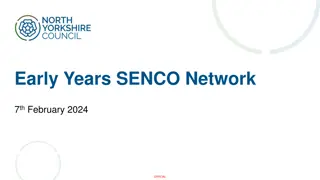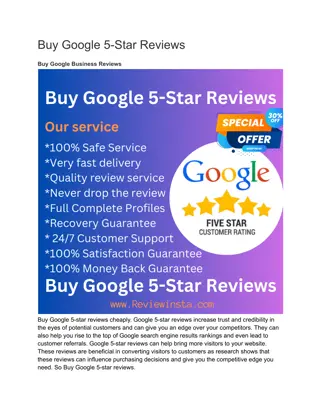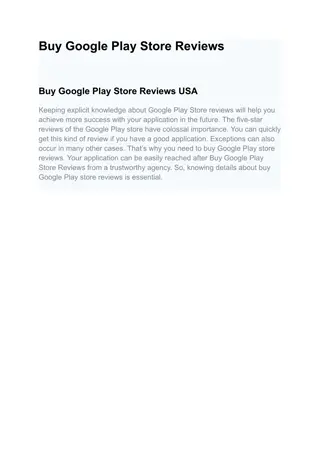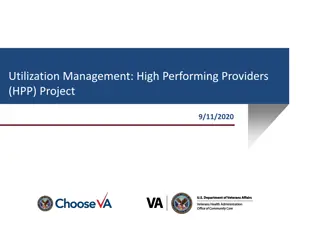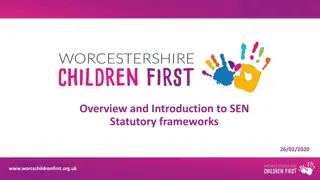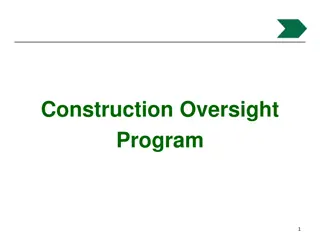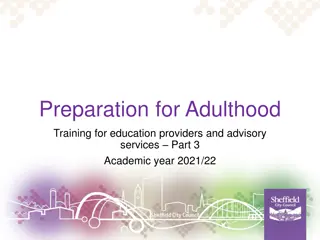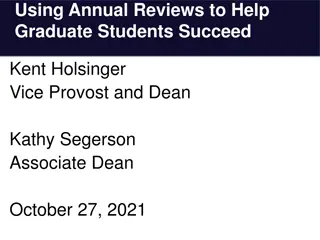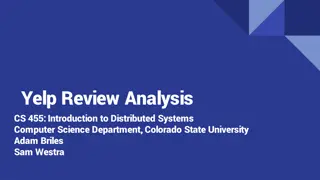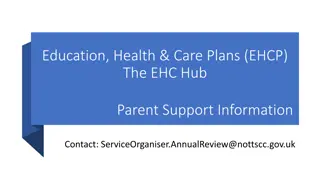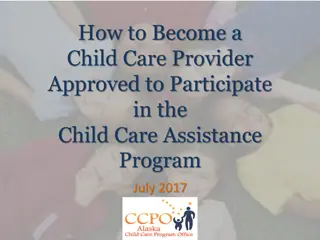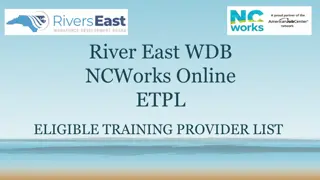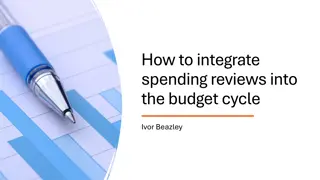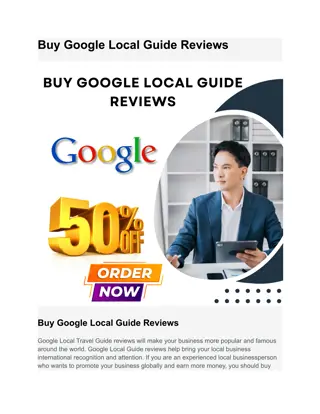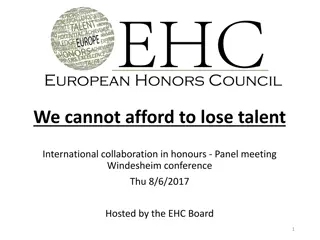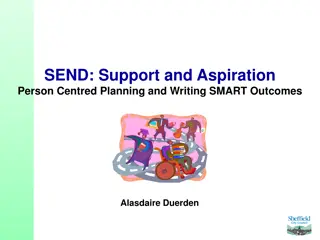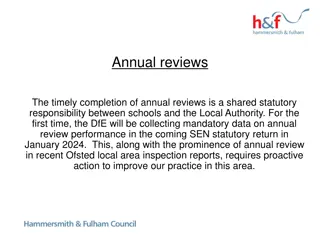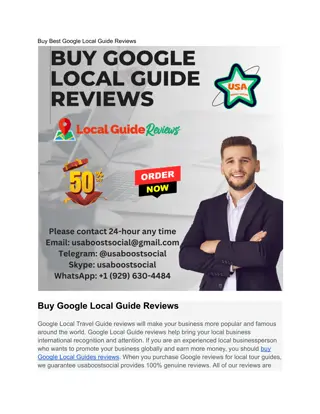Understanding EHC Plan Annual Reviews for Educational Providers - Training Overview
Training for education providers and advisory services on conducting EHC Plan Annual Reviews for the academic year 2020/21. The training covers review processes, roles, timelines, and outcomes to ensure children's needs are met in compliance with statutory requirements.
Download Presentation

Please find below an Image/Link to download the presentation.
The content on the website is provided AS IS for your information and personal use only. It may not be sold, licensed, or shared on other websites without obtaining consent from the author. Download presentation by click this link. If you encounter any issues during the download, it is possible that the publisher has removed the file from their server.
E N D
Presentation Transcript
EHC Plan Annual Reviews Training for education providers and advisory services Academic year 2020/21
Introduction Training delivered in 3 parts: 1. Training power point 2. Round table discussion 3. Further training and Q&A Updated paperwork and guidance document available on learnsheffield/Inclusion Taskforce website
Session aims To explain how to review Education, Health and Care needs, provision and outcomes through a single plan To embed a process of review rather than a review meeting To make sure that the child is central to the process For all SENCOs to understand the practical requirements of an EHC Plan annual review For advice givers and advisory services to understand their role in the review of an EHC Plan To explain what should be done before, during and after a review meeting To answer questions that SENCOs and services have about the annual review process
What is an annual review? A legal requirement Cycle of assess plan do review The route to monitor progress throughout the year Involving services and advice givers as needed Annual process of evidencing what s working, what s not working and what needs to change Route to monitor that provision in the plan is in place SEND Code of Practice 9.166-9.185 Regular review of progress 3 times a year Code of Practice 6.64-6.71 https://youtu.be/zwdLXbhKA0A Vital to ensure that a child's needs are being met in line with their statutory plan
Timelines A reminder it s a process, not a meeting Local Authority discharges its duties to arrange the review to education providers Starts when initial plan / decision to make amends or not is issued Plan through the year and follow key timelines Every 6 months for children under 5, annually for those of school age unless there s a need to complete the review earlier https://www.learnsheffield.co.uk/Downloads/InclusionDocu ments/20- 21/EHC%20Plan%20annual%20reviews%20Nov%202020 .pdf https://learnsheffield.co.uk/Downloads/InclusionDocument s/19- 20/Education%20Health%20and%20Care%20Plans%20- %20Annual%20reviews%20statutory%20processes.docx
POSSIBLE ANNUAL REVIEW OUTCOMES EHC Plan is appropriate no changes needed The Annual Review process is complete The local authority provides educational settings with a list of review meetings due in the term The meeting organiser issues Annual Review meeting invites & circulates reports to all parties The local authority notifies parents/ young people and education provider of the outcome of the Annual Review OR At least two weeks before Annual Review meeting At least two weeks before start of term In Annual Review meeting takes place Within two weeks of the meeting Within four weeks of the meeting EHC Plan is amended, a draft is issued for consultation EHC Plan is finalised. The process is complete advance of Annual Review meeting LA intends to change the EHC Plan Throughout the year Information gathered throughout the year as part of Assess Plan Do Review to contribute to the Annual Review The meeting organiser completes a report of the meeting & sends it to the local authority (Annual Review paperwork) Education provider requests updated information from child, family and involved services to inform review OR LA is EHC Plan is ceased. The process is complete LA considering ceasing the EHC Plan - consultation proposes to cease the EHC Plan
Some important extra dates Reviews for children moving to a different phase of their education must be completed early enough to allow time for the local authority to consult with educational settings and make any changes to the plan by: 15 February for children moving from early years to primary school, infant to junior school and primary to secondary school 31 March for children moving from secondary school to post-16 settings, and between post- 16 settings
Pause and think What has worked well for you in the annual review process What are the biggest challenges for you in addressing annual reviews? Pause this video for a few minutes and reflect on these questions Record any questions you have as we will look to answer these in the Q&A session
During the year Put in place provision in the EHC Plan Evidence gathering how provision in the plan is put in place, impact of that provision, how provision is contributing to outcomes Involvement of agencies to support provision in the plan or where there are additional needs identified, particularly if expectation of changes being made may require additional reports Progress reviews throughout the year evidenced through support plan good communication with the child and their family
Measuring outcome and impact Setting and measuring outcomes Evidence impact Holistic approach including health and care provision Training on outcome setting will cover further how to measure outcome and impact
The meeting beforehand The process through the year is essential to ensure the meeting can summarise the review Administration invites, time, length, location etc Gathering the child s voice Parent participation Involving services Required paperwork
Pause and think. What has worked well in your experience in the work beforehand What are the barriers to the work beforehand Pause this video for a few minutes and reflect on these questions Record any questions you have as we will look to answer these in the Q&A session
The meeting Person centred approach Myth busting: Person centred is not about great drawing but about asking the right questions Hear everyone s voice particularly the child s Share information from those not there A discussion not completing a form Key parts include: - Person centred discussion what s working, not working and needs to change - Progress against outcomes - Preparation for Adulthood (Y9 onwards) - Proposed changes to the EHC Plan - Agreed actions and next steps
Person Centred Questions What are your strengths? What are your child s strengths? What do you like? What does s/he like? What do you like and admire about your child? What do others like and admire about your child? What is important for him, now and in the future? What is important for you now and in the future? Who are the important people in your child s life? What is working for your child at home and at school? What is not working for your child at home and at school? How does your child learn best? What needs to change? What help does your child need?
Making changes to the plan The review is the point to bring together proposed changes Annotate the EHC Plan through tracked changes or written amends on the plan identify evidence in reports Primary and secondary needs Recording SSG levels Change of placement involve external agencies Ending a plan Re-assessment Where there is disagreement as to the proposed changes this must be recorded
Making changes to the plan Think about: - Factual accuracy - Curriculum - Environment - Skills required to meet needs - The resources needed (financial, people, equipment, etc)
Changes to sections of the plan Section A Views, interests and aspirations B Special Educational Needs Suggested changes Is information still relevant? If not then what should they say? Evidence from Parent and young people views Are strengths and needs accurate and articulated? If not what should change? Do needs reflect current assessments (eg learning levels)? School assessments and reports Involved services evidence in review, updated reports, service discussions Health reports and services Information from parents MAST, Social Care, Inclusion & Attendance Information from parents C Health needs Are health diagnosis and needs included and accurate? Have they changed? Are care needs included and accurate? Have they changed? D Care needs
Changes to sections of the plan (2) Section E Outcomes Suggested changes Are outcomes relevant? Are they SMART? Are key areas covered? The Annual Review meeting is the process to make suggested additions and changes to outcomes plus the time to set new interim targets for the coming year Evidence from Annual review meeting, support from involved services
Changes to sections of the plan (3) Section F SEN Provision Suggested changes Is all currently delivered provision in place that is required included in the plan? Is there additional provision that has been identified? Evidence from If school are putting in place substantially more than is identified in the plan then evidence from provision map and support from advisory services Health reports and services Information from parents G Health provision Is health provision in place or identified by health practitioners included in the plan? Health provision that teaches and trains is in Section F Is care provision in place or identified and agreed by services included in the plan? H1/H2 Care provision MAST, Social Care, Inclusion & Attendance Information from parents
After the meeting Complete the Annual Review report Attach all relevant evidence from the year Ensure proposed amendments are identified on the EHC plan Send all information to SENDSARS within 2 weeks of the review meeting Copy to the family and involved services
The Report Updated paperwork Needs to be completed in full Annotated version available Paperwork created as a table so you can insert extra lines Checklist at end
Pause and think. Based on this what do you need to change in regards to your involvement with annual reviews? Pause this video for a few minutes and reflect on these questions Record any questions you have as we will look to answer these in the Q&A session
Training part 2 & 3 Part 2 round table discussion Part 3: o Transition o Preparation for adulthood o What do SENDSARS do with the plan o Emergency / Early Reviews o Q & A



